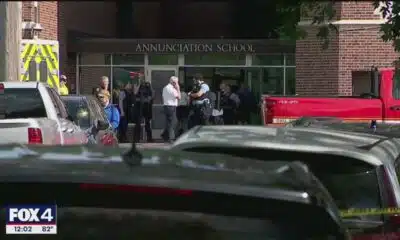News from the South - Missouri News Feed
Lawmakers negotiating Missouri budget add $300M to public schools spending
by Rudi Keller, Missouri Independent
May 8, 2025
Missouri’s public schools would be fully funded and a policy some blame for undermining a child care subsidy program would be fixed, legislative budget negotiators decided Wednesday night as they worked through eight of the 13 spending bills for state operations in the coming year.
Over about three hours, the conference committees of five lawmakers from both the House and Senate resolved differences between the spending bills, more often than not by selecting the option that spent more money.
Tracking by The Independent shows the eight bills completed Wednesday would spend $450 million more general revenue than Gov. Mike Kehoe’s January budget proposal, $636 million more than the House version approved in April and $118 million more than the version approved in the Senate last week.
The committees will reconvene Thursday to finalize spending decisions on five more bills, with the full House and Senate scheduled to vote Friday in advance of the constitutional deadline.
The differences that must be resolved are between the $49.4 billion plan for day-to-day operations approved in the Senate and the $47.9 billion plan approved in the House.
The education budget that will go to the chambers for final approval includes $4 billion for the public school foundation formula, including a $297 million increase that Kehoe opposed. The Department of Elementary and Secondary Education budget will also include $107 million Kehoe recommended to revamp how child care providers are paid, basing it on enrollment instead of attendance.
House Budget Committee Chairman Dirk Deaton, a Republican from Noel, tried to defend the decision to back Kehoe’s view that the money shouldn’t be spent. But he was outnumbered, with Democratic House members joining unanimous backing from senators for Senate Appropriations Chairman Lincoln Hough’s position that state law required the money to be appropriated.
“This is the most important thing we’re going to do today, and this is a statutory minimum that we have in a commitment that we’ve made to our kids back home,” state Rep. Betsy Fogle, a Springfield Democrat, said as she advocated for the foundation formula increase.
As he agreed to the increase, Deaton looked forward to the commission Kehoe created to consider changes to the formula.
“I do hope, when you look at the formula, if we have an opportunity to rewrite it, that we won’t let unelected bureaucrats make a $300 million call or something similar to future general assemblies,” Deaton said.
Along with the two big items in the education department, the conference committees:
- Adopted Kehoe’s pay plan proposal for state employee raises, which will reward longevity. State workers will get a 1% raise for every two years of state employment, capped at 10% for 20 years.
- Agreed to increase the base budgets for all state colleges and universities by 3%, which was the amount approved in the Senate. The House had adopted Kehoe’s recommendation for a 1.5% boost and added $27.1 million for campus maintenance needs, which was cut by the negotiators.
- Removed language directing the Missouri Lottery to begin a three-year pilot program for lottery courier services.
The budget negotiators began working about 8:30 p.m., about 12 hours later than the scheduled start.
The day began with tensions between Deaton and Hough. As Hough was wrapping up a meeting of the Senate Appropriations Committee two rooms away, Deaton was announcing that because Hough was absent, the conference meetings would begin at 10 p.m.
Deaton said he was kept waiting six hours Monday before Hough met with him. They worked for about seven hours to resolve issues that they could present to the conference committees, then for 15 minutes on Tuesday.
He said he was not informed of Hough’s intent to be ready to work in the afternoon after a recess of the committee for short floor sessions.
“I’ve not heard anything since yesterday at 1 o’clock,” Deaton said.
Hough said he worked with Senate leadership to plan time for the conference meeting. He thought it was communicated to the House.
“It was stated by me on multiple occasions that my intention was to get together this afternoon after a few hours of floor time,” Hough said.
Hough tried to get the conference committees together about 3 p.m., after both chambers had adjourned for the day, but Deaton was not willing and did not appear.
The budget negotiations, when they finally began, went relatively quickly and without rancor. Deaton and Hough took turns reading through the budget lines and stating the intent to take the House or Senate position, or a compromise number in between.
Members interrupted often, usually to challenge a decision about an item among the 166 new earmarked items for programs or projects added to the eight bills. Only 12 added at some point didn’t make the final cut.
State Sen. Barbara Washington, a Kansas City Democrat, spoke up in favor of one threatened with a cut, $50,000 for Global One Urban Farming in Kansas City.
“This really helps the children in that community with growing food,” Washington said. “It is only $50,000. It’s so little. I know I ask for a lot, but I don’t ask for a lot of money.”
Instead of being cut, the organization will receive $25,000.
Hough and Deaton both got the earmarks most identified with them in the budget. Deaton cut $8 million to restore a historic footbridge in Springfield and Hough cut $19 million to buy land for a state park in McDonald County.
Unsurprisingly, both made it into the budget.
State Sen. Brian Williams, a University City Democrat, questioned Deaton on the decision to cut $500,000 slated for an urgent care program for veterans in Kansas City. It was one of three earmarked items for veterans alongside $1 million for temporary housing for veterans in St. Louis and $1 million for a veterans housing program in Columbia.
Williams said one consideration for earmarked appropriations of general revenue should be where the money is generated in taxes. Kansas City and St. Louis need to be treated fairly as the richest areas of the state, he said.
“Jackson County makes up a significant amount of the economy in our state, we need to ensure that our budget reflects that,” Williams said.
Deaton said one factor in the decision was the amount being dedicated to veterans programs and the limited nature of state funds.
“There’s the give and the take, there’s money in, money out,” Deaton said. “We can’t do everything, unfortunately and be all things for all people at all times. We’re doing a lot for veterans in this budget.”
The final budget will have $500,000 for the Kansas City urgent care program and $500,000 for the St. Louis temporary housing program.
No one challenged Hough or Deaton when they said they were approving earmarked spending that was in or near their districts. Fogle, however, challenged Hough when he cut $4 million from an economic development organization called Innovate SOMO.
“I know you feel like you gotta give a little bit, but I would rather not give with our community,” Fogle said.
“I think,” Hough replied, “our community is fairly well served in this legislature.”
YOU MAKE OUR WORK POSSIBLE.
Missouri Independent is part of States Newsroom, a nonprofit news network supported by grants and a coalition of donors as a 501c(3) public charity. Missouri Independent maintains editorial independence. Contact Editor Jason Hancock for questions: info@missouriindependent.com.
The post Lawmakers negotiating Missouri budget add $300M to public schools spending appeared first on missouriindependent.com
Note: The following A.I. based commentary is not part of the original article, reproduced above, but is offered in the hopes that it will promote greater media literacy and critical thinking, by making any potential bias more visible to the reader –Staff Editor.
Political Bias Rating: Centrist
The article reports on a Missouri budget conference meeting where legislative budget negotiators from both the House and Senate worked to resolve differences in the state’s spending bills. The tone of the reporting is factual, with a focus on the bipartisan nature of the discussions and the resolution of funding decisions. There is no overt ideological leaning in the way the events are presented, and the article provides balanced coverage, including perspectives from both Republican and Democratic lawmakers. The content reflects a straightforward, neutral account of the budget negotiations without any noticeable partisan slant.
News from the South - Missouri News Feed
Five new Missouri laws to know that become official Thursday
SUMMARY: Starting August 28, 2025, several Missouri laws will take effect, impacting economy, safety, and more. HB 567 ends mandated paid sick leave and halts minimum wage cost-of-living increases. SB 28 eliminates temporary vehicle tags, requiring sales tax payment and issuance of printed plates at purchase. SB 43 criminalizes hazing in universities, limits childhood marriage licenses, and encourages reporting hazing incidents with immunity. SB 82 restricts water exports outside Missouri, requiring permits and oversight to protect resources. SB 133 mandates contacting Missouri 811 before any digging to prevent utility damage. Additional laws address newborn safety, hearing aids, substitute teaching, school participation, cell phone policies, invasive plants, and court interpreters.
The post Five new Missouri laws to know that become official Thursday appeared first on fox2now.com
News from the South - Missouri News Feed
LIVE SOON: Authorities to speak after at least 5 students injured, suspect ‘contained’ in Minneapolis Catholic school shooting
SUMMARY: A shooting at Annunciation Catholic School in Minneapolis injured at least five children, with the suspected shooter contained. The incident occurred during an all-school Mass. Children’s Minnesota and Hennepin Healthcare treated victims, while police reported 20 total victims. Three people, including the shooter, are reported dead. Nearby residents heard several minutes of gunfire. Families gathered at a reunification zone as students were evacuated. Governor Tim Walz and Mayor Jacob Frey condemned the violence, with emergency teams activated. The FBI is involved, sending agents to the scene. The community is shaken, with many expressing fear and sorrow over the tragedy.
Read the full article
The post LIVE SOON: Authorities to speak after at least 5 students injured, suspect 'contained' in Minneapolis Catholic school shooting appeared first on www.ozarksfirst.com
News from the South - Missouri News Feed
Missouri becomes first state to repeal capital gains tax, at an estimated $625M cost
by Rudi Keller, Missouri Independent
August 27, 2025
A new Missouri income tax cut exempting profits from the sale of investments officially takes effect Thursday, along with smaller tax changes that will remove sales tax from diapers and feminine hygiene products.
All state laws passed in a regular session take effect Aug. 28 unless another date is specified. The capital gains tax cut will apply to all gains since Jan. 1 and will be reflected in the income tax returns due in April.
With the bill, MIssouri became the first state to exempt profits from the sale of assets such as stocks, real estate, and cryptocurrency from income tax.
“The (Department of Revenue) is already preparing for next year’s tax season and we are making the adjustments required to accommodate this and other new laws that affect taxpayers,” Trish Vincent, the state revenue agency’s director, said in a news release.
The exemption is officially estimated to reduce revenue by approximately $157 million in the current fiscal year and about $111 million annually on an ongoing basis. But the fiscal note, updated June 23 after the bill was passed but before Gov. Mike Kehoe signed it, included a warning that the impact could be much larger.
Missouri taxpayers claimed $13.3 billion in capital gains income for 2022 on their federal income tax forms.
“Therefore, taking the 4.7% top rate would yield ($625.6 million) for FY 2026,” the new fiscal note states.
That is the same estimate The Independent reported in April based on estimates from the Institute for Tax and Economic Policy. The oversight division stated it “does not currently have the resources and/or access to state tax data to produce a thorough independent revenue estimate and is unable to verify the revenue estimates provided by (the Department of Revenue).”
Federal tax changes will further reduce state revenue, and the state is anticipating new costs for programs such as Medicaid funded jointly with the federal government.
Through Monday, general revenue has grown faster than expectations but the trend for the year is not clear. When he signed the budget in June, Kehoe vetoed about $300 million in earmarked items and warned of a looming shortfall.
“The Office of Administration’s Division of Budget and Planning estimates a nearly $1 billion shortfall in general revenue starting in (fiscal year 2027),” the release stated. “Contributing to this shortfall, ongoing general revenue spending authorized in the (fiscal year 2026) budget is projected to outpace ongoing revenues by nearly over $1 billion and grow larger in future years.”
YOU MAKE OUR WORK POSSIBLE.
Missouri Independent is part of States Newsroom, a nonprofit news network supported by grants and a coalition of donors as a 501c(3) public charity. Missouri Independent maintains editorial independence. Contact Editor Jason Hancock for questions: info@missouriindependent.com.
The post Missouri becomes first state to repeal capital gains tax, at an estimated $625M cost appeared first on missouriindependent.com
Note: The following A.I. based commentary is not part of the original article, reproduced above, but is offered in the hopes that it will promote greater media literacy and critical thinking, by making any potential bias more visible to the reader –Staff Editor.
Political Bias Rating: Center-Right
This content focuses on a Missouri state tax policy that exempts capital gains from income tax, a measure generally favored by fiscally conservative or center-right policymakers who advocate for lower taxes to stimulate investment and economic growth. The reporting is largely factual and includes budgetary concerns and potential revenue shortfalls, providing a balanced overview without strong partisan language. Overall, the tone and content align with a center-right viewpoint, emphasizing tax cuts and fiscal implications common in conservative economic policy discussions.
-
News from the South - Arkansas News Feed6 days ago
New I-55 bridge between Arkansas, Tennessee named after region’s three ‘Kings’
-
News from the South - Texas News Feed4 days ago
DEA agents uncover 'torture chamber,' buried drugs and bones at Kentucky home
-
Local News7 days ago
Picayune Police Department increases effectiveness of drug busts, leading to decrease in offenses
-
News from the South - Missouri News Feed6 days ago
Missouri settles lawsuit over prison isolation policies for people with HIV
-
News from the South - Louisiana News Feed7 days ago
Families with citizen children deported by ICE sue Trump administration
-
News from the South - Georgia News Feed7 days ago
Bookman: Here’s how Georgia’s 2020 election crisis will factor into 2026 GOP campaigns for governor
-
News from the South - Virginia News Feed6 days ago
Erin: Tropical storm force winds 600 miles wide eases into Atlantic | North Carolina
-
Our Mississippi Home6 days ago
Vardaman: The Sweet Potato Capital Serving Up Love, Tradition, and Flavor at Sweet Potato Sweets










































